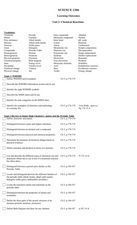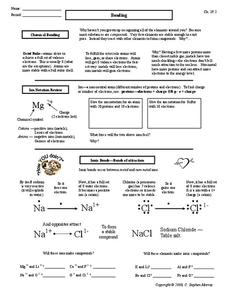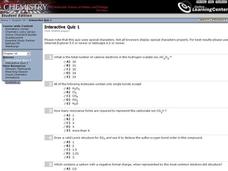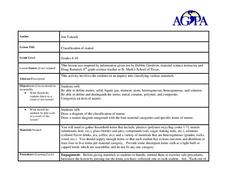Alabama Learning Exchange
Float or Sink?
Experiment with mass and density as scholars figure out what makes things float or sink. First, they watch a podcast introducing these concepts. Be sure to use the comprehension question to test their understanding. Young scientists...
Curated OER
Mining Minerals
Students define the properties of minerals and their uses in their world. In this multi-lesson unit, students contribute actively to discussions of mineral mining, mining methods and mine safety. A role play lesson asks students to...
Curated OER
Help Wanted: A Lighting Engineer For Popular Rock Group
Students are assigned to groups, and determine each member's role in the group. They will design an experiment to determine a way to produce the three primary and five secondary colors. Students discuss color and mood. They listen to a...
Curated OER
Beams Word Search
In this word search worksheet, students search for 32 hidden words found vertically, horizontally, backwards or diagonally. Words are words encountered during visits to "The Jefferson Labs."
Curated OER
The Mole
This compact collection of slides explains the history and use of the mole unit. Relative atomic mass, as John Dalton understood it, is explained. Avogadro's number is also introduced. The mole, or the unit for the amount of a substance,...
Curated OER
Learning Outcomes
In this science worksheet, learners explore the learning outcomes for a unit on chemical reactions. Students define 60 vocabulary words and answer a list of questions for each topic.
Curated OER
Covalent Bonding - Electron Dot Structures
A short paragraph helps explain how covalent bonds are formed, and then your class will complete the Electron/Dot and Structural diagrams for the molecules given. The valence diagrams will reinforce understanding. This activity would be...
Curated OER
Polyatomic Ions
Opening with a chart of common polyatomic ions, and finishing with an explanation of how to name polyatomic ions, this presentation is to the point. The links on the vocabulary page do not work, leaving you only a few slides to work...
Curated OER
Properties of Metals
Fifth graders study the properties of metals and use them to identify different properties. In this metal properties instructional activity students complete a demonstration .
Curated OER
Bonding
In this bonding learning exercise, students read about the two different types of chemical bonding: ionic and covalent bonds. Students review ion notation and oxidation numbers. This learning exercise has 24 fill in the blank, 2...
Curated OER
Activity #4 What Do Equations Mean?
Students practice with writing and balancing simple chemcial equations. they comprehend that chemical equations are a method of using a set of univeral symbols to represent what happens experimentally in chemical reactions. Pupils...
Curated OER
Ionic Chemical Formulas Days 1 & 2
Students study polyatomic ions and write binary and ternary ionic chemical formulas. They explore putting together different monatomic ions and coming up with as many chemical formulas as possible. They play a game similar to memory...
Curated OER
What is a Chemical Reaction?-Evidence of Change
In this chemical reactions learning exercise, students experiment with hydrochloric acid and copper (I) chloride to identify the types of reactions they undergo with various other substances. They also observe the law of conservation of...
Curated OER
Chemical Bonding and Shapes of Molecules
In this chemical bonds worksheet, students review the different types of bonds, Lewis dot structures, ions, and molecule shapes. This worksheet has 10 matching, 17 multiple choice, and 3 drawing questions.
Curated OER
GCSE Module 6 Revision Guide-Chemistry-Oil, Fossil Fuels and Earth's Atmosphere
In this oil, fossil fuels and Earth's atmosphere learning exercise, students answer 3 questions about the origin of oil and its uses, the effects of burning oil and fossil fuels on the Earth's atmosphere and the origin and maintenance of...
Curated OER
Writing and Balancing Equations
In this equations worksheet, students identify simple reactions as direct combination, decomposition, single replacement, or double replacement. This worksheet has 20 fill in the blank questions.
Curated OER
Charge and Electricity
In this electricity worksheet, students read about electric charge, ionic notation, and conductors and insulators. Then students complete 19 matching, 6 fill in the blank, and 2 short answer questions.
Curated OER
Chemicals, Chemicals, Everywhere
Students divide substances into categories: made of chemicals/not made of chemicals, synthetic/naturally occurring, and toxic/nontoxic. They observe a mystery chemical and determine what precautions they need to take when handling an...
Curated OER
Chemical Reactions
In this chemical reaction worksheet, students investigate the results of mixing calcium chloride with sodium bicarbonate. They observe the chemical and physical changes that occur, identify the properties of the chemical before and after...
Curated OER
Chemistry and Bonding
In this bonding worksheet, students take an interactive quiz with 15 multiple choice questions about the VSEPR Theory, bonding, the geometry of molecules, Lewis structures, resonance structures and enthalpy changes.
Curated OER
Exam Review: Chemistry Calculations
In this chemistry calculations review worksheet, students solve 33 review problems about titrations, precipitates, pressure and volume of gases, combustion reactions, heat of combustion, molar concentrations and molecular formulas.
Curated OER
What's the Matter?
Students explore the components of matter. They discover what matter is, the states of matter, and how heat and cold cause it to change states in an online format. In addition, they complete internet-based lessons, activities, and quizzes.
Curated OER
Stoichiometry
In this stoichiometry activity, students review definitions and equations associated with molarity, density, atomic mass, molarity, and dilutions. This activity has 18 word problems.
Curated OER
Classification of Matter
Students investigate common household items and classify them into types of matter. In this matter lesson, students group given items into categories based on their characteristics. They also complete a concept map about matter and...

























